Avoid getting scammed by sites claiming "You've made the 5-billionth search"
Phishing/ScamAlso Known As: "You've Made The 5-billionth Search" virus
Get free scan and check if your device is infected.
Remove it nowTo use full-featured product, you have to purchase a license for Combo Cleaner. Seven days free trial available. Combo Cleaner is owned and operated by RCS LT, the parent company of PCRisk.com.
What is "You've Made The 5-billionth Search"?
"You've Made The 5-billionth Search" is a scam, which is a part of another scam called "You Have Won A Google Gift" and is distributed through a deceptive website.
People commonly visit websites of this type unintentionally - they are redirected to them by potentially unwanted applications (PUAs) installed on their computers or web browsers. In summary, these applications cause unwanted redirects to untrustworthy websites. Furthermore, they usually collect data and feed users with intrusive advertisements.
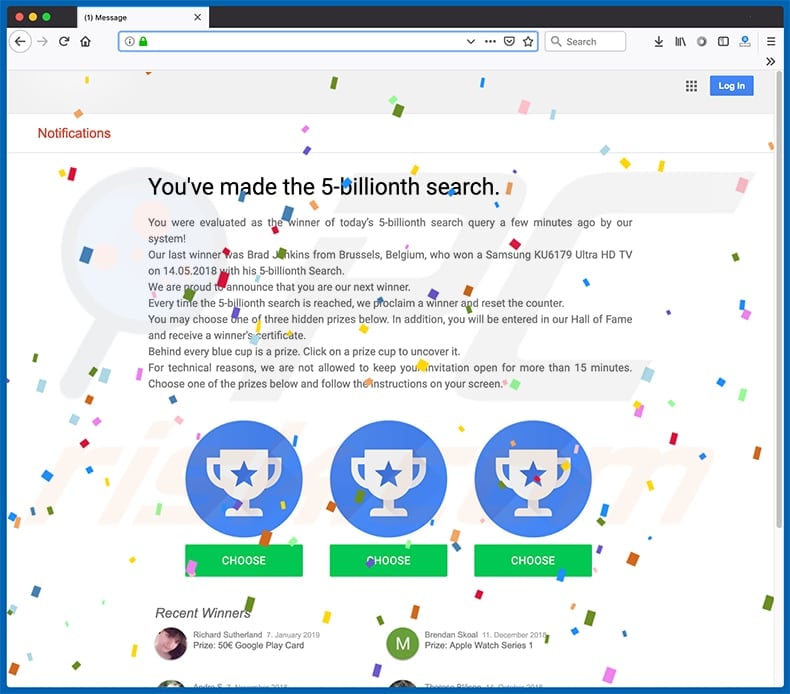
The main purpose of the "You've Made The 5-billionth Search" scam is to trick people into believing that they were selected as winners of a 5-billionth search query. At time of research, scammers behind this scam cite a (probably non-existent) person called Brad Jenkins from Brussels as the last winner who supposedly won a Samsung KU6179 Ultra HD TV on 14.05.2018.
This deceptive website declares every visitor to be the next winner. It displays three "CHOOSE" buttons that allow visitors to choose one of three hidden prizes. It states that anyone who takes this opportunity will also be entered into a 'Hall of Fame' and will receive a winner's certificate.
Scammers behind the "You've Made The 5-billionth Search" scam also urge people to take action (claim their prize) within 15 minutes, otherwise the offer no longer applies. If one of the buttons is clicked, this deceptive website opens a pop-up window, which displays information about which prize the visitor has been qualified to win.
In our example, the prize was an iPhone X. There is a screenshot of this pop-up window below. There are two options given: to accept a chance to win or close the page. It is very likely that by accepting, people will be asked to provide various details (as part of surveys, and so on).
We advise against accepting any offers that are displayed on deceptive websites. The best option is to simply close these websites. If they cannot be closed normally, we recommend that you use Task Manager and end the entire browser process.
Note, however, that the closed session should not be restored, since this will return you to the same site, or another web page that leads to it.
As mentioned in our introduction, potentially unwanted applications force people to visit dubious websites designed to promote scams, however, they also feed users with intrusive ads. PUAs deliver coupons, banners, pop-ups, surveys, and so on.
It is impossible for these ads to go unnoticed, since they are usually displayed via tools that enable placement of third party graphical content on any site. Therefore, they conceal underlying content of visited websites. Furthermore, if clicked, they often redirect to untrustworthy, potentially malicious websites.
In some cases, they run scripts designed to download/install even more (additional) unwanted applications. Another negative side of having PUAs installed is that they gather data. For example, IP (Internet Protocol) addresses, search queries, URLs of visited websites, geo-locations, and so on.
There is a strong possibility that personal, sensitive details might also be collected. All data is collected with the purpose to share it with third parties who misuse private information to generate revenue. Note that some of these parties might be cyber criminals.
Thus, having these apps installed might can lead to problems with the privacy, browsing safety, or can even result in identity theft. We strongly recommend that you uninstall all installed unwanted applications immediately.
| Name | "You've Made The 5-billionth Search" virus |
| Threat Type | Phishing, Scam, Social Engineering, Fraud |
| Related Domains | wargrowcover[.]top, parenteggsearch[.]xyz, firstnotgun[.]top, shdeedek[.]live, xuowltwo[.]live, sacsuitza[.]link, picdadhis[.]live, heydipdoc[.]live |
| Detection Names (wargrowcover[.]top) | Google Safebrowsing (Phishing), Kaspersky (Malware), Sophos (Spam), Full List Of Detections (VirusTotal) |
| Symptoms | Unauthorized online purchases, changed online account passwords, identity theft, illegal access of one's computer. |
| Distribution methods | Deceptive emails, rogue online pop-up ads, search engine poisoning techniques, misspelled domains. |
| Damage | Loss of sensitive private information, monetary loss, identity theft. |
| Malware Removal (Windows) |
To eliminate possible malware infections, scan your computer with legitimate antivirus software. Our security researchers recommend using Combo Cleaner. Download Combo CleanerTo use full-featured product, you have to purchase a license for Combo Cleaner. 7 days free trial available. Combo Cleaner is owned and operated by RCS LT, the parent company of PCRisk.com. |
"Dear Browser User", "Comcast Cable Communications Congratulations", and "$1000 VISA Gift Card" are just a few examples of other scams that operate in a similar manner to "You've Made The 5-billionth Search". They are used by scammers who attempt to extort money from innocent people or to extract personal details.
The main purpose of scammers who employ these scams is to generate revenue. The aforementioned PUAs are all very similar. They are promoted as useful and legitimate, however, once installed, they deliver none of the functions promised and are designed only to generate revenue for the developers.
How did potentially unwanted applications install on my computer?
Potentially unwanted applications can sometimes be downloaded from their official websites, however, people usually install them unintentionally through clicked intrusive advertisements or when a deceptive marketing method called "bundling" is used. Developers use this method to trick people into installing unwanted applications together with other chosen software.
In most cases, PUAs are hidden in "Custom", "Advanced" (and other similar) options/settings of the installation (or download) set-ups. Information regarding the inclusion of PUAs is usually not properly disclosed. Furthermore, many users skip software installation/download steps an click various advertisements, thus causing inadvertent installation of potentially unwanted applications.
How to avoid installation of potentially unwanted applications?
Careless behaviour is usually the reason for problems relating to online, browsing safety and privacy. Therefore, browse the internet and download and install software carefully. Do not download software from unofficial, untrustworthy websites, using Peer-to-Peer networks, third party downloaders, or other similar channels/tools.
Check all available "Custom", "Advanced" and other similar options when installing or downloading software. Note that cyber criminals invest considerable time and money into design of their advertisements. Therefore, most seem legitimate. In fact, they often lead to adult dating, pornography, gambling, and other similar untrustworthy, potentially malicious sites.
If you experience unwanted redirects to dubious websites, check all extensions, add-ons, and plug-ins that are installed on your browser and remove any suspicious, unwanted entries. Also make sure that there are no programs of this kind on the list of installed programs on your computer.
If your computer is already infected with PUAs, we recommend running a scan with Combo Cleaner Antivirus for Windows to automatically eliminate them.
Text presented in "You've Made The 5-billionth Search" pop-up:
You've made the 5-billionth search.
You were evaluated as the winner of today's 5-billionth search query a few minutes ago by our system!
Our last winner was Brad Jenkins from Brussels, Belgium, who won a Samsung KU6179 Ultra HD TV on 14.05.2018 with his 5-billionth Search.
We are proud to announce that you are our next winner.
Every time the 5-billionth search is reached, we proclaim a winner and reset the counter.
You may choose one of three hidden prizes below. In addition, you will be entered in our Hall of Fame and receive a winner's certificate.
Behind every blue cup is a prize. Click on a prize cup to uncover it.
For technical reasons, we are not allowed to keep your invitation open for more than 15 minutes. Choose one of the prizes below and follow the instructions on your screen.
The appearance of "You've Made The 5-billionth Search" (GIF):
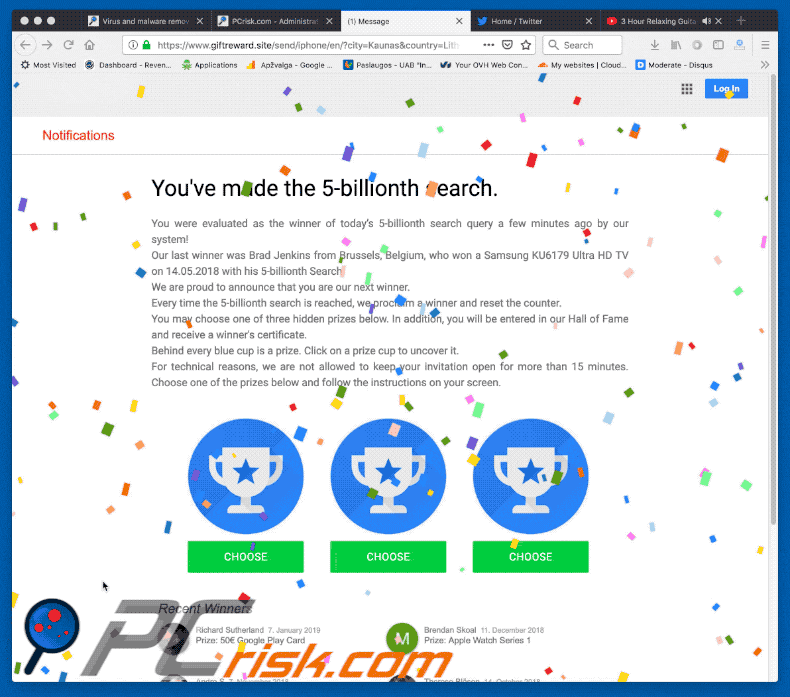
Screenshot of a pop-up window that appears when the "CHOOSE" button is clicked:
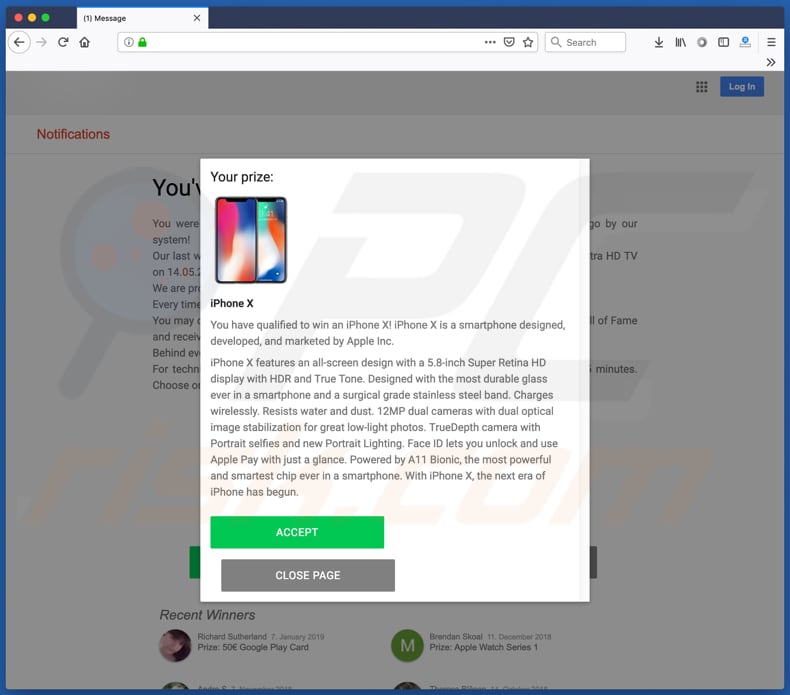
Another variant of this scam (it now says that the user has made a "7.38-billionth search"):
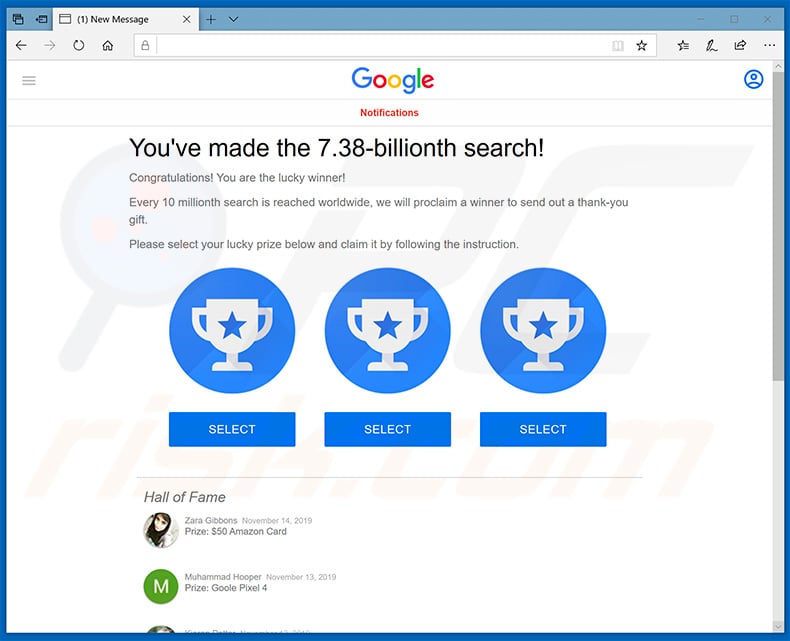
Text presented within this page:
You've made the 7.38-billionth search!
Congratulations! You are the lucky winner!
Every 10 millionth search is reached worldwide, we will proclaim a winner to send out a thank-you gift.
Please select your lucky prize below and claim it by following the instruction.
Another example of "You've Made The 5-billionth Search" pop-up scam:
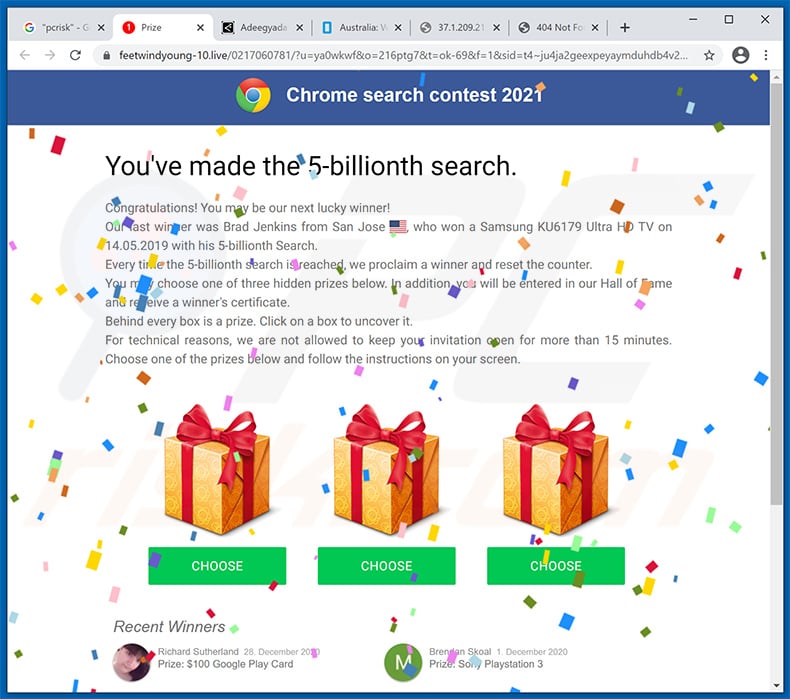
Text presented within:
Chrome search contest 2021
You've made the 5-billionth search.Congratulations! You may be our next lucky winner!
Our last winner was Brad Jenkins from San Jose , who won a Samsung KU6179 Ultra HD TV on 14.05.2019 with his 5-billionth Search.
Every time the 5-billionth search is reached, we proclaim a winner and reset the counter.
You may choose one of three hidden prizes below. In addition, you will be entered in our Hall of Fame and receive a winner's certificate.
Behind every box is a prize. Click on a box to uncover it.
For technical reasons, we are not allowed to keep your invitation open for more than 15 minutes. Choose one of the prizes below and follow the instructions on your screen.
Richard Sutherland 28. December 2020
Prize: $100 Google Play Card Brendan Skoal 1. December 2020
Prize: Sony Playstation 3 Andre S 28. October 2020
Prize: $500 Google Play Card Therese Bläsen 4. October 2020
Prize: $250 Google Play Card Anime Sucht 30. August 2020
Prize: Apple Watch 3 Katja Schönefeld 1. August 2020
Prize: Galaxy S10 Stefan Lochter 3. July 2020
Prize: $250 Amazon Gift Card suri- ja 24. May 2020
Preis: iPhone Xs Basti Friedel 27. April 2020
Preis: Apple Watch 3 Rene Weger 1. April 2020
Prize: $500 Google Play Card
An example of a virtually identical scam website with a different number - 18.25-billionth search:
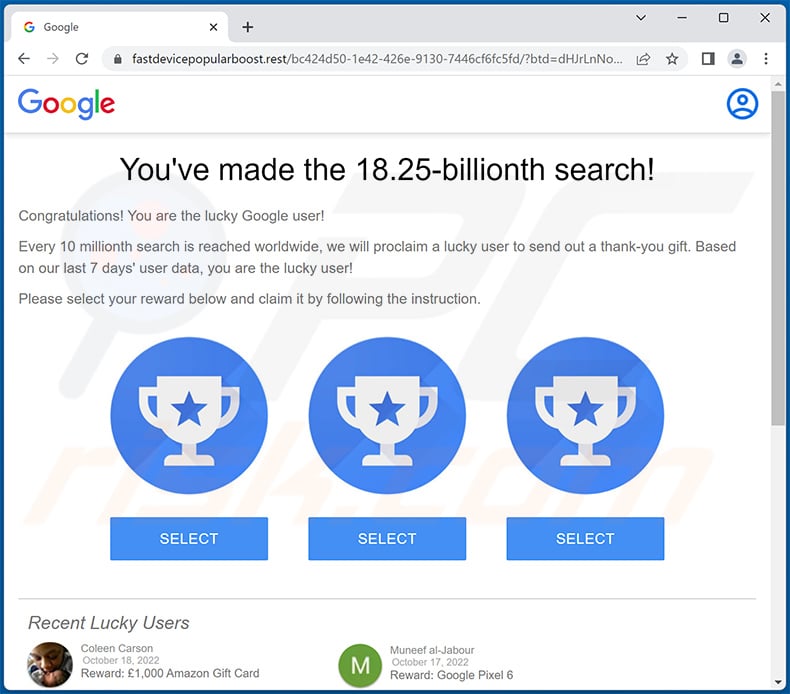
Text presented within:
You've made the 18.25-billionth search!
Congratulations! You are the lucky Google user!Every 10 millionth search is reached worldwide, we will proclaim a lucky user to send out a thank-you gift. Based on our last 7 days' user data, you are the lucky user!
Please select your reward below and claim it by following the instruction.
Instant automatic malware removal:
Manual threat removal might be a lengthy and complicated process that requires advanced IT skills. Combo Cleaner is a professional automatic malware removal tool that is recommended to get rid of malware. Download it by clicking the button below:
DOWNLOAD Combo CleanerBy downloading any software listed on this website you agree to our Privacy Policy and Terms of Use. To use full-featured product, you have to purchase a license for Combo Cleaner. 7 days free trial available. Combo Cleaner is owned and operated by RCS LT, the parent company of PCRisk.com.
Quick menu:
- What is "You've Made The 5-billionth Search" virus?
- How to identify a pop-up scam?
- How do pop-up scams work?
- How to remove fake pop-ups?
- How to prevent fake pop-ups?
- What to do if you fell for a pop-up scam?
How to identify a pop-up scam?
Pop-up windows with various fake messages are a common type of lures cybercriminals use. They collect sensitive personal data, trick Internet users into calling fake tech support numbers, subscribe to useless online services, invest in shady cryptocurrency schemes, etc.
While in the majority of cases these pop-ups don't infect users' devices with malware, they can cause direct monetary loss or could result in identity theft.
Cybercriminals strive to create their rogue pop-up windows to look trustworthy, however, scams typically have the following characteristics:
- Spelling mistakes and non-professional images - Closely inspect the information displayed in a pop-up. Spelling mistakes and unprofessional images could be a sign of a scam.
- Sense of urgency - Countdown timer with a couple of minutes on it, asking you to enter your personal information or subscribe to some online service.
- Statements that you won something - If you haven't participated in a lottery, online competition, etc., and you see a pop-up window stating that you won.
- Computer or mobile device scan - A pop-up window that scans your device and informs of detected issues - is undoubtedly a scam; webpages cannot perform such actions.
- Exclusivity - Pop-up windows stating that only you are given secret access to a financial scheme that can quickly make you rich.
Example of a pop-up scam:

How do pop-up scams work?
Cybercriminals and deceptive marketers usually use various advertising networks, search engine poisoning techniques, and shady websites to generate traffic to their pop-ups. Users land on their online lures after clicking on fake download buttons, using a torrent website, or simply clicking on an Internet search engine result.
Based on users' location and device information, they are presented with a scam pop-up. Lures presented in such pop-ups range from get-rich-quick schemes to fake virus scans.
How to remove fake pop-ups?
In most cases, pop-up scams do not infect users' devices with malware. If you encountered a scam pop-up, simply closing it should be enough. In some cases scam, pop-ups may be hard to close; in such cases - close your Internet browser and restart it.
In extremely rare cases, you might need to reset your Internet browser. For this, use our instructions explaining how to reset Internet browser settings.
How to prevent fake pop-ups?
To prevent seeing pop-up scams, you should visit only reputable websites. Torrent, Crack, free online movie streaming, YouTube video download, and other websites of similar reputation commonly redirect Internet users to pop-up scams.
To minimize the risk of encountering pop-up scams, you should keep your Internet browsers up-to-date and use reputable anti-malware application. For this purpose, we recommend Combo Cleaner Antivirus for Windows.
What to do if you fell for a pop-up scam?
This depends on the type of scam that you fell for. Most commonly, pop-up scams try to trick users into sending money, giving away personal information, or giving access to one's device.
- If you sent money to scammers: You should contact your financial institution and explain that you were scammed. If informed promptly, there's a chance to get your money back.
- If you gave away your personal information: You should change your passwords and enable two-factor authentication in all online services that you use. Visit Federal Trade Commission to report identity theft and get personalized recovery steps.
- If you let scammers connect to your device: You should scan your computer with reputable anti-malware (we recommend Combo Cleaner Antivirus for Windows) - cyber criminals could have planted trojans, keyloggers, and other malware, don't use your computer until removing possible threats.
- Help other Internet users: report Internet scams to Federal Trade Commission.
Frequently Asked Questions (FAQ)
What is a pop-up scam?
Pop-up scams are intended to deceive users into performing specific actions, e.g., making bogus payments, disclosing personal information, downloading files, installing untrustworthy/malicious software, purchasing dubious/harmful products, etc.
What is the purpose of a pop-up scam?
Pop-up scams are created to generate revenue for their designers. Scammers can profit by obtaining funds through deception, abusing or selling private data, promoting software, proliferating malware, and so on.
Why do I encounter fake pop-ups?
Pop-up scams are promoted on various rogue sites, which are seldom accessed intentionally. Most visitors to such websites enter them via mistyped URLs, deceptive browser notifications/ advertisements, sites that use rogue advertising networks, or installed adware.
Will Combo Cleaner protect me from pop-up scams?
Combo Cleaner can scan the websites you visit and detect malicious ones. Sites that run scams also fall under this category; therefore, you will be warned, and access to such pages will be restricted.
Share:

Tomas Meskauskas
Expert security researcher, professional malware analyst
I am passionate about computer security and technology. I have an experience of over 10 years working in various companies related to computer technical issue solving and Internet security. I have been working as an author and editor for pcrisk.com since 2010. Follow me on Twitter and LinkedIn to stay informed about the latest online security threats.
PCrisk security portal is brought by a company RCS LT.
Joined forces of security researchers help educate computer users about the latest online security threats. More information about the company RCS LT.
Our malware removal guides are free. However, if you want to support us you can send us a donation.
DonatePCrisk security portal is brought by a company RCS LT.
Joined forces of security researchers help educate computer users about the latest online security threats. More information about the company RCS LT.
Our malware removal guides are free. However, if you want to support us you can send us a donation.
Donate
▼ Show Discussion